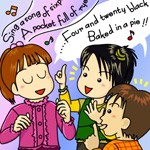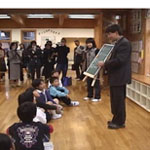■
『世界の英語教室 (小学校)』
「日本の小学校英語活動・番外編」
By Mina Hisada/Illustration by Puri
「山崎先生が語る英語教育」

|
|
英語、勉強してる?
|
◆
今回は、前回に引き続き東京都稲城市立若葉台小学校の山崎智明先生にお話をうかがいます。どこの小学校でも抱えている、
「ALTの予算」「なぜ担任の先生が教えなければならないのか」といった問題が浮きぼりになるとともに
、多くの先生が不安に思っている「発音」についても、解決策をお話してくださいます。
(This time, we will be talking again to Mr.Tomoaki Yamasaki from Wakabadai Elementary School, Inagi-shi, Tokyo. He will talk about common problems faced by elementary schools in Japan, such as budgets for employing ALTs, and questions like why homeroom teachers have to teach English at all.
He will also talk about how to approach pronunciation, which is a major
source of concern among teachers.)
QUESTION :
若葉台小学校で「担任主導の英語活動」になったいきさつをお話ししていただけますか?
(Why should English lessons be taught by (※)homeroom teachers?)
(※)In Japan, elementary school teachers teach all subjects, unlike
in junior high school where each subject is taught by a different teacher.
As things stand, elementary school teachers don't have the formal training to teach English.
This would be a major issue if teaching English
in elementary schools were to become compulsory.

|
|
山崎先生
|
Mr. Yamasaki:
一つは予算的な問題です。ALTを年35時間、3年生以上の学年に配置したらどれほどの
費用がかかるでしょうか?また、英語専科教員を作るとか中学校の英語教員が受け持つなどの案もありますが、これも実現はむずかしいでしょう。
(There are a number of reasons, but the main reason is cost.
Just imagine how much it would cost to employ an ALT to teach
35 hours to each grade above third grade. It's a lot of money.
I know there are some people who are wondering why it's not possible
to have teachers who specialize in teaching English, but
this would be difficult to make a reality.)
もう一つは、年間活動計画もないまま、ALTに丸投げの授業をするとどうなるでしょうか?系統的な学習課程がないまま場当たり的に教えたら、
6年生よりも3年生の方が難しいことをやっていたり、同じようなゲームを毎回やっていたりするなどの弊害が出てきます。
こうした問題を克服するためには、学校全体で「何のために英語を教えるのか」というテーマをしっかり持って、
そこから各学年の目標や年間活動計画を組み立てていかなければなりません。
(Another question worth thinking about is:
is it advisable to let an ALT teach students without
some kind of set curriculum? Teaching without a curriculum could end in chaos -
third-grade kids could end up learning English of a higher level than sixth-grade kids,
or else, they could spend all their classes just playing games. To avoid these
kinds of situations, teachers have to focus on why they
are teaching English to kids, and then prepare a curriculum accordingly.)
これは、担任が主体となっていかなければできないことです。また、担任はクラスの実態を誰よりも把握しているのだから、
個に応じた指導ができます。たまに来るALTがいきなりクラスの中で英語活動をやっても、うまくいくわけはないのです。
( I believe that only homeroom teachers
are capable of addressing this question of
why kids need to be taught English, because they are the ones who know
the students best. You can't expect this from an ALT, because they are not as
familiar with the teaching environment at that school and they don't know the kids as well.)
QUESTION :
英語活動をするにあたって、どのようなことを心がけていますか?
(What do you keep in mind when you teach English?)

|
|
いつの間にか口ずさんでる歌
|
一つは、「おさかな天国効果」です。数年前流行した「おさかな天国」という歌がありますよね。別に覚えたいわけではないけれど、
魚屋さんやスーパーでいつもかかっているから知らず知らずのうちに口ずさめるようになってしまった。
だから、今でも覚えていますよね?そんな歌が、皆さんにもあるのではないでしょうか?
私は英語活動の基本は、「無理に覚えなくてもいつの間にか覚えていた」という、この「おさかな天国効果」が重要だと思っています。
(One thing is the song "Fish Paradise"
(a very popular song in Japan a few years ago). Do you remember it? You never
really sat down and learned it, but you knew it,
because wherever you went, it was there, as background music. I think we can use a similar method.)
若葉台小学校では週3回朝の10分を利用して、「英会話たいそう」などのビデオを見たり、
休み時間に英語の歌を放送したりする「全校インプット」を行なっています。
ここでは、ある一定の放送サイクルで何度も何度も繰り返して見せたり聞かせたりします。
こうすることで一度出てきた構文が、しばらく時間をおいてからまた出てきます。そして、
何回もこのサイクルを見聞きしているうちに、いつの間にか覚えていくことが可能になります。
また、全校インプットの良さは、1年生から6年生まで全ての学年が同じ英語を知ることになる点です。
だから、6年生が1年生に「英会話たいそう」を教えに行くこともできます。
こうすることで、高学年としての自覚を持ち、モチベーションを高めることもできます。
(In my school,
we watch Eikaiwa Taiso for 10 minutes three times a week
in the morning, and we also listen to English-language songs before break time.
We let the kids listen to same songs or same sentences
over and over again so they can remember them.. The merit of this
is that all the kids, from first grade to sixth grade, learn the same
things. So the kids in sixth grade could go and teach the first grade kids,
and in this way, we motivate them as well as give them a sense of responsibility. )

|
|
楽しく、明るく
|
次に、教師が発音の模範になる必要はないと言うことです。多くの小学校教師は、
自分の下手な英語を子どもが覚えたらどうしようという不安を抱えています。でも、その心配はいりません。ビデオやCDが発音の模範になり
、教師は一緒にそれを見て、リピートさせたり、褒めたり励ましたりする、それで十分です。
Moving on to pronunciation, I know that most of us worry that
kids might be taught the wrong pronunciation, or they'll start imitating
the Japanese accents of their Japanese teachers. But that shouldn't be a concern. There are videos,
CDs. Our role is to listen to them together with the kids. That's enough.)
それから最後に、「英語活動はとにかく楽しく明るく」ということを心がけています。
いすに座って学習することも大切なのですが、たまには解き放たれ気分を発散する時間も欲しいですよね。英語活動にはリズムがあります。
大きな声で歌ったり会話をする場面、ゲームなどで体をいっぱい動かす場面、静かにALTの話を聞いたり、ビデオやCDを聞く場面。
さまざまなメリハリを持って授業をやることで、子供たちは英語活動に楽しく参加できます。
パフォーマンスが好きな子もそうでない子も、勉強が得意な子も得意でない子も、生き生きと活動し、大きな声で "Let me try!" と手を挙げ、
みんなの前で英語を話してくれる。そんな時間になるように、心がけています。
(Finally, I'd like to emphasize that English class should be fun. Of course it's
important to study seriously, but kids sometimes need to relaxed. There are many activities
you can do in English class — singing songs, reciting, playing games, listening to a story,
watching videos and CDs. There are also lots of different types of kids. Some kids like performing
in front of other kids, others don't, some people are good at studying, others aren't. But I'd like
them all to really get into English,
really get enthusiastic about it. That's the sort of learning environment I'd like to create.)
QUESTION :
小学校で英語が必須化するかもしれないことについては、どのように考えていますか?
(What do you think about English becoming a compulsory subject in elementary school?)
Mr. Yamasaki:
まず、小学校で英語をやるべきか否かという議論があります。私は推進の立場です。
なぜなら前述のように、英語を音楽と考えて歌ったり踊ったりすること、ジェスチャーをつけたりすることは、思春期の中学生には気恥ずかしく
、なかなかできることではないでしょう。でも、日本人の英語下手をなくすには、この過程が非常に大切なのです。
だから、中学校英語の先取りを小学校でやるのではなく、小学校でしかできないことをやるべきだと思います。
(First of all, I am all for the idea. Why? Because once they become
junior high school students, they're less likely to want to dance and sing in English.
That's something you can only do when they're kids, and that's why elementary school is so important in allowing Japanese to be more open to English. We're not trying to bring forward the kind of English education you find
in junior high school. We're going to do what can only be done in elementary school.)
QUESTION :
英語活動をしている、全国の小学校の先生に一言お願いします。
(Do you have any advice for elementary school teachers in Japan?)

|
黒船来航!?
|
Mr. Yamasaki:
「自分が英語を教えることになるとは夢にも思わなかった」という小学校の先生はたくさんおられます。英語活動は小学校の教員にとって、
まさに「黒船来航」なのです。でも、私は「案ずるより産むがやすし」と言いたいのです。小学校の先生とは、
そもそもいろいろな教科を教えなければならないため、オールマイティー集団なのです。
子供を授業に引きつけるためのさまざまな引き出しもたくさん持っています。
(I know there are many teachers who never thought they would have to teach English.
The idea of compulsory English education in elementary schools is probably like Perry's
Black Ships to them, but I would like to say to them, "It's always darkest before dawn.
Don't think too much about, just do it. It's easier than you think. Remember, elementary school
teachers are already capable
of teaching many different subjects. What's one more? We already know how to get the kids interested.)

|
山崎先生授業風景
|
さあ、とにかく、始めてみましょう。英語活動を始めると、子どもが生き生きとしてきます。
そんな子どもを見ていると、先生が子どもたちからパワーをもらい、先生も変わっていきます。様々な試行錯誤はあるとは思いますが、とにかく前向きに取り組んで欲しいと思います。
(Anyway, let's get on with it! When learning
English, kids look so happy. You can get a real positive energy
from them and you yourself will start changing alongside them.
I know you're feeling a lot of anxiety and fear towards the
idea, but thinking in a positive way is what's most important.)
☆★編集後記☆★
2回に分けてお送りした山崎先生のインタビューも、今回で終わりになります。
「空耳英語」「揚げ豆腐」「お魚天国効果」といった先生ならではの言葉がたくさん出てきました。
現場の先生にとって「黒船来航」とまでいわれる小学校英語教育。今後の行方を引き続き見守っていきたいと思います。
This is the concluding part of Mr. Yamasaki's interview.
Previously he gave us a summary of what English education is
like now, and gave us some interesting words to think about.
Teaching English in elementary
schools is a major issue of teachers, and I would like to report further about it in the future.
****これまでの、小学校英語教育(日本編)に関するインタビューは 以下になります。****
(For the interviews on English Education in Japan are as follows.)

|
「〜オーストラリア人教師からみた日本の英語教育〜」はこちら
(Click here!)
"Intreview with Mr.Peter Revelant from Australia"
|

|
「〜玉川大学文学部・佐藤久美子先生へのインタビュー〜」
はこちら(Click here!)
"Interview with Dr.Kumiko Sato, Tamagawa University"
|

|
「〜東京都稲城市立若葉台小学校・山崎智明先生へのインタビュー(その1)〜」
はこちら
(Click here!)
"Interview with Mr. Tomoaki Yamasaki by Wakabadai Elementary school"
|
|
|










